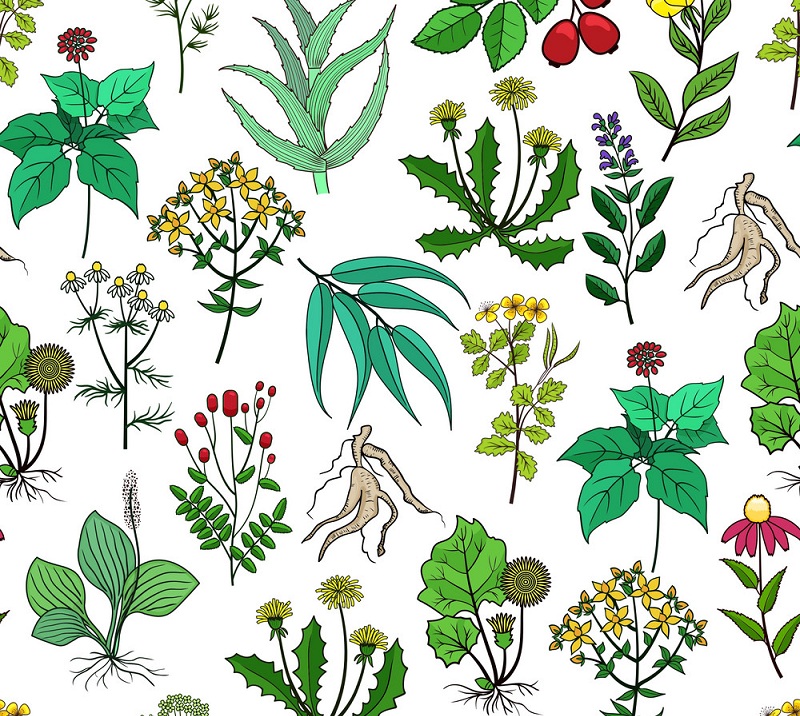Many people wind up swinging back to the medicinal plants that started everything: Herbal cures that can mend and lift physical and mental health. Picking the correct plant can appear to be hard to somebody who essentially needs to feel better without taking medication. This guide may be the starting point for the people who wish to coordinate home grown cures into their lives. As usual, talk with your doctor before beginning any new health treatment.
1. Flax seed
Flax seed, likewise accessible as an oil, is one of the more safe decisions among plant-based dietary supplements. Grown for thousands of years, today flax seed is praised for its cell reinforcement action and calming benefits.
More research should be done with humans, however one study says that flax seed can help prevent colon cancer.
Another study states that flax seed can reduce blood pressure. It can even help with reducing obesity. Many people include flax seed in their meal, and it’s likewise accessible as tablets, oil and flour.
The most ideal way to include flax seed is through your diet.
You should consider:
- Flax seed can influence estrogen production in women, particularly in the event that they have a history of cancer or are pregnant.
- Try not to eat raw or unripe flax seeds, as they can be harmful.
2. Chamomile
Chamomile is another medicinal plant that is thought to have anti-anxiety properties. A lot of people know this plant since it’s a well known tea flavor, however it can likewise be ingested through fluids, capsules or tablets.
The calming powers of chamomile have been regularly examined, including a recent report that states chamomile is better than taking a placebo while treating anxiety disorder. One recent study affirmed it’s safe for long term use, and another one looked past its use for anxiety and affirmed that it additionally demonstrates potential in anticancer medications.
There are two kinds of chamomile: German chamomile, an annual that flourishes in the Midwest, and Roman chamomile, a perennial that draws in pollinators and smells like apples.
You should consider:
- It can interact with blood thinners.
- It can cause allergic reactions.
3. Gingko
As one of the oldest tree species, gingko is also one of the oldest homeopathic plants and a key herb in Chinese medicine.
The leaves are utilized to make capsules, tablets and extracts, and when dried, can be used as a tea. It’s maybe best-known for its capacity to help brain wellbeing. Studies state that gingko can help patients with mild to moderate dementia, and can slow down the symptoms of cognition decline in dementia and Alzheimer’s disease.
Recent research is investigating a part that can help with diabetes treatment, and there are even more studies, including an animal study that says it might influence bone healing.
The gingko tree is viewed as a living fossil, with fossils dating from 270 million years back. These trees live for 3,000 years.
You should consider:
- Long-term use may increase chance of thyroid and liver cancer, which has been seen in rats.
- It’s known to be difficult for the liver, so liver enzymes should be observed.
- It can interact with blood thinners.
- Gingko seeds are poisonous whenever ingested.
- Side effects can include headache, upset stomach, dizziness and allergic reaction.
- Gingko use needs to be discussed with your doctor because of numerous drug interactions.
4. Tea tree oil
The tea tree (native to Australia) creates an oil that is for quite some time been believed to be useful for skin conditions, including mild acne, athlete’s foot, small injuries, dandruff, bug nibbles and other inflammatory skin conditions.
There needs to be further study into acne and scalp use, but for now, there’s a degree of research into the antimicrobial superpowers of tea tree oil on wounds and topical infections.
One recent study states that tea tree oil hindered the development of skin acne-causing organisms. It’s ordinarily utilized as a highly concentrated essential oil. Tea tree oil should be diluted in a transporter oil.
You should consider:
- Tea tree oil is poisonous if taken orally.
- Your skin could experience an allergic reaction.
- It may influence hormones.
- Long-term use isn’t recommended.
5. Lavender
This fragrant, purple blossom has a genuinely solid standing among studies, which have mainly focused on its anti-anxiety capacities.
It’s turned out to be soothing in a research led among dental patients, while another study confirmed that lavender can affect mood and cognitive performance. It’s likewise been lauded for its soothing properties to help people get their proper sleep.
Recently, it’s been found that lavender carries anti-inflammatory benefits as well. It’s best diluted and applied to the skin or utilized in fragrance based treatment (aromatherapy), and it has few side effects.
You should consider:
- It can cause skin irritation.
- It’s poisonous if taken orally.
- It may disrupt hormones when applied undiluted.

